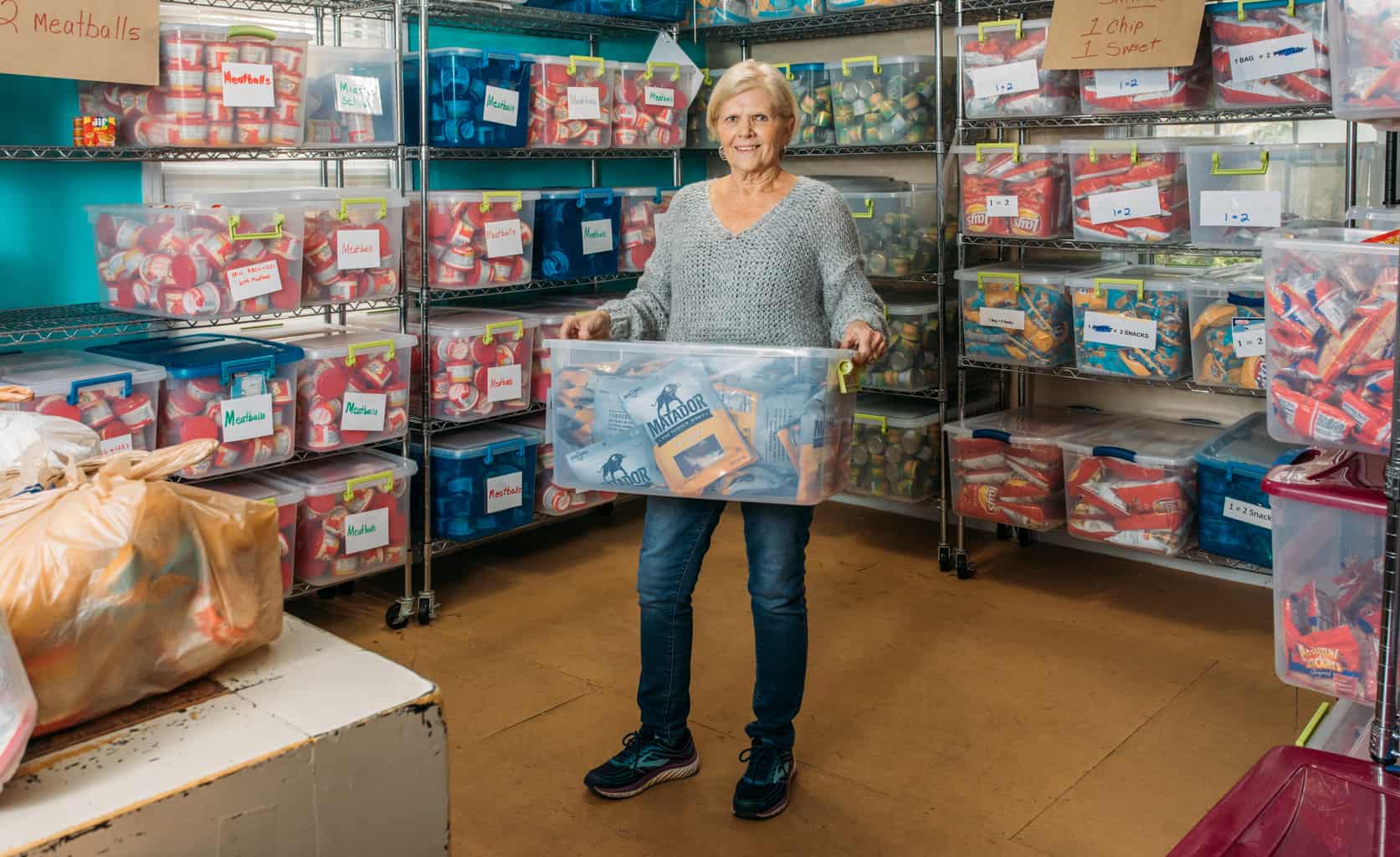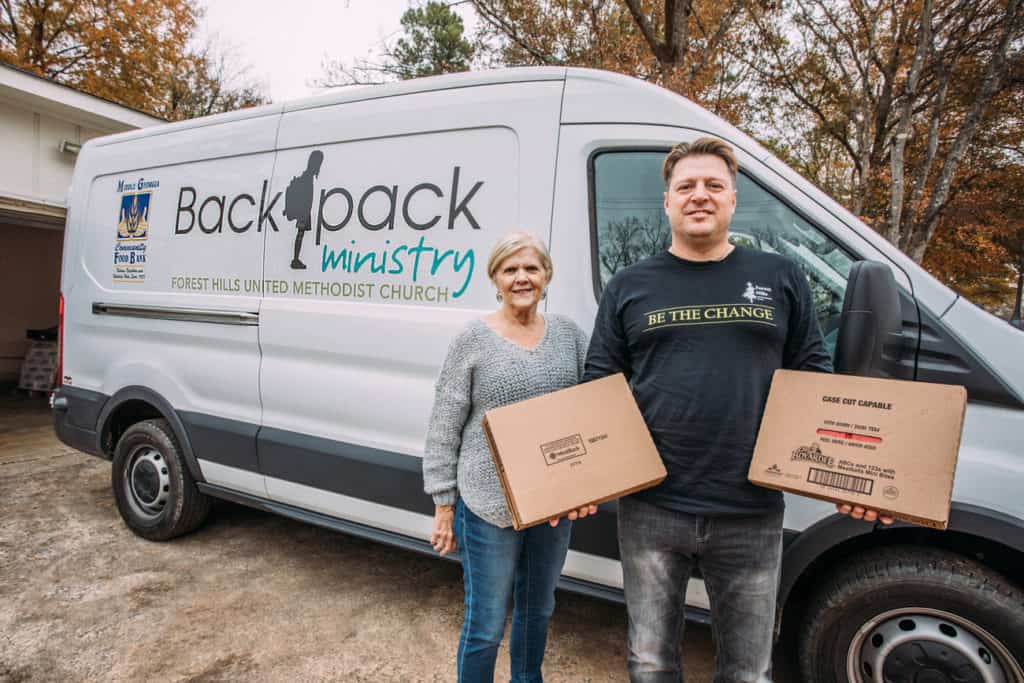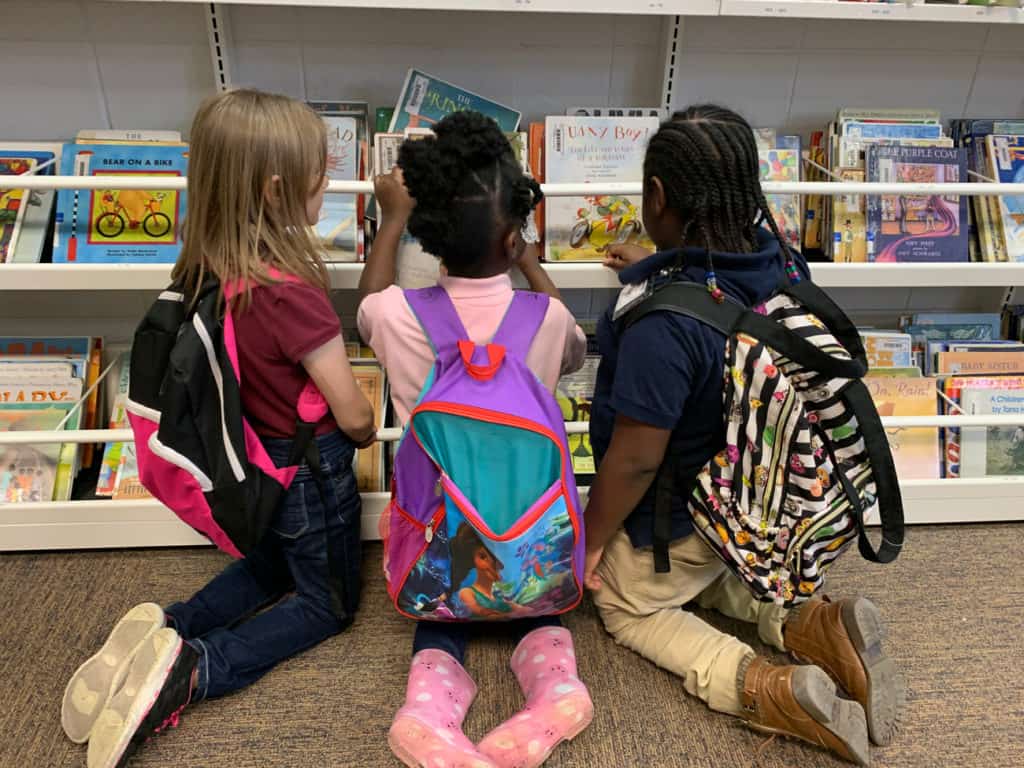
Backpack Buddies
Weekend meal delivery fosters better student relationships, attitudes and grades
By Michael W. Pannell
Photos by Matthew Odom
Brenda Lambert and Ann Adkisson are hustling, working quickly getting stacked boxes of peanut butter unpacked and jars shelved before a team of volunteers arrives to repack them with other food items in bags or backpacks.
It’s hurried but familiar work.
The peanut butter came from the Middle Georgia Community Food Bank. Volunteers – about 400 in total – come from Forest Hills United Methodist Church and dozens of partner organizations, businesses, churches, schools, universities and families. They regularly pack and deliver weekend food parcels to nearly 2,000 students at 22 schools in Macon-Bibb, Monroe and Twiggs counties.
Adkisson remembers eight years ago when Lambert – her friend and fellow Forest Hills small group Bible study member – brought up the idea that led the group to pack weekend food for an initial nine children.
“Nine! When we started it was nine and now 1,878?” Adkisson both asks and exclaims. “It’s sad there’s such a need. I still don’t see how we do it except we pray a lot. I’m glad we do, though, and glad for volunteers who make it happen. I’m afraid most of us don’t have any idea what some of these children go through.”
At Forest Hills, they call it the Backpack Ministry. Elsewhere, similar efforts go by Backpack Buddies and other names, but the idea is always to provide hungry children – who need nutritional support through free school breakfast and lunch programs – similar support over weekends.
“We had no idea it would lead here,” Lambert said. “We just started working out of our kitchens.”
Now they work out of a large, church-owned house converted to a shelved warehouse of sorts. More storage buildings are out back. Food comes in weekly, mainly from the Food Bank, donations and other vendors — wherever the price is best. It’s shelved, repacked in bags (or backpacks if a child needs one), placed in rolling carts, and loaded in vans to go to schools. All by volunteers, including Lambert and Adkisson.

Matthew Odom
At schools, volunteers personally hand bags to students or leave them in classrooms depending on school needs. About 200 volunteers, vetted and background-checked, get to hand out bags.
“The food is important, that’s what we do. But from the start, we knew this was more about relationships than anything,” Lambert said. “Relationships with students, teachers, principals, counselors and volunteers. There’s encouragement in that. And from the start, we were always sensitive as to whether taking food would embarrass children. We never want to do that.”
April Griffin is a counselor at Union Elementary School where she said 120 of the school’s 520 students benefit from the weekend food.
“Kids ask me every Monday, Tuesday, Wednesday and Thursday, ‘Are they coming? Are we going to get our backpacks this week?’ They know they come on Friday but they want that reassurance,” she said.
Griffin said she’s seen attitudes change and grades improve among many in the program. It’s a result of interaction with the volunteers as well as from the food.
“Somehow it clearly helps attendance,” she said. “That’s clear and it also has a positive impact on behavior. Kids look forward to seeing their grown-up backpack friends and it’s an incentive.”
What’s in th
e bags?
“It has to be child-friendly, child-sized and pop-top items are great,” Lambert said. “That means individual servings; we can’t use gigantic cans of beans or whatever. We like putting 15 items in, but sometimes with food bank shortages or low funds, it’s more like 12. We typically put four drinks, three proteins, three fruit items, three snacks and two breakfast items. Things like cheese and crackers, fruit cups, shelf-stable milk, cereal, breakfast bars, chips, varieties of things like that.”
Lambert said if food could be bought strictly from the Middle Georgia Community Food Bank it would only cost about $1.50 to feed each child each week. But because food has to meet the child-friendly requirement and because of shortages, that can’t happen. Usually, it’s a mix. When buying retail, the cost per child is about $5 a week.
In light of such varied items, Lambert searched for a way to quantify how much food goes out each Friday. She said, “Take 1,878 children, multiply that by each getting three milk or juice boxes and you get 5,634 going to children every week. That’s just a part, and that’s a lot.”
And the need grows, even as food banks face shortages and ministry donations may be up or down that week. Lambert said after two schools combined, need there rose from 130 to 209 students. Sadly, she had to tell officials she couldn’t meet it. She could only do 170. Adkisson said that was difficult because Lambert is someone who has never said no to the need – but in this case, she had to.
Rising demand isn’t limited to that one instance. Lambert said at the end of last school year, volunteers were serving 1,200 students compared to the current 1,878 – an increase of 678 students. Lambert said it takes more than 200 volunteers to get the job done every week. Volunteer hours spent packing, getting food to schools and handing it out add up to more than 60 hours.
“The church provides the house and other things, but we’re not part of the church budget,” Lambert said. “We depend strictly on donations, grants and giving from individuals, groups, organizations, anyone.”

How can you help?
Food is the biggest need, Lambert said.
“Right now, child-friendly food, but our needs change weekly when school’s in. Sometimes it’s food, sometimes it’s funds for food. We have great volunteers, but can always use more. People get sick and we need subs. Individuals can drop off items. Groups can sponsor drives. There’s a wide-open door for people to contact us and so many ways to help.”
Success of the Backpack Ministry and its relationships led the Forest Hills congregation to start another ministry.
“We started Beyond Backpacks to meet different needs we heard of from teachers and counselors,” said Baxter Hurley, senior pastor at Forest Hills. “They let us know particulars and we’ve helped. We’ve given things like school supplies, school uniforms, underwear, lice kits, and even furniture, beds and housewares. In one case – a very sad case – we helped pay funeral expenses. It’s part of the impact we want to have based on the love God has shared with us.”
Lambert said the need is heartrending, but the work rewarding.
“It can be pretty mundane,” she said. “You unload food, pack bags, load bags, unload them. Then it hits you: each one represents a child, one who might go hungry if they don’t get it.
“And this is Central Georgia. It helps precious children in need right here. We can do something about it. We are doing something about it. I tell you, it changes you. It changes students who help, school teams and business people who come. It’s a community effort and it absolutely changes the lives of hungry kids every weekend.”
To learn more
If you’re interested in being part of the community effort spearheaded by Forest Hills UMC to provide nutritious food and snacks to students in need, contact the Forest Hills office at 478-477-1161 or Backpack Ministry leader Brenda Lambert at bslambert@bellsouth.net.







